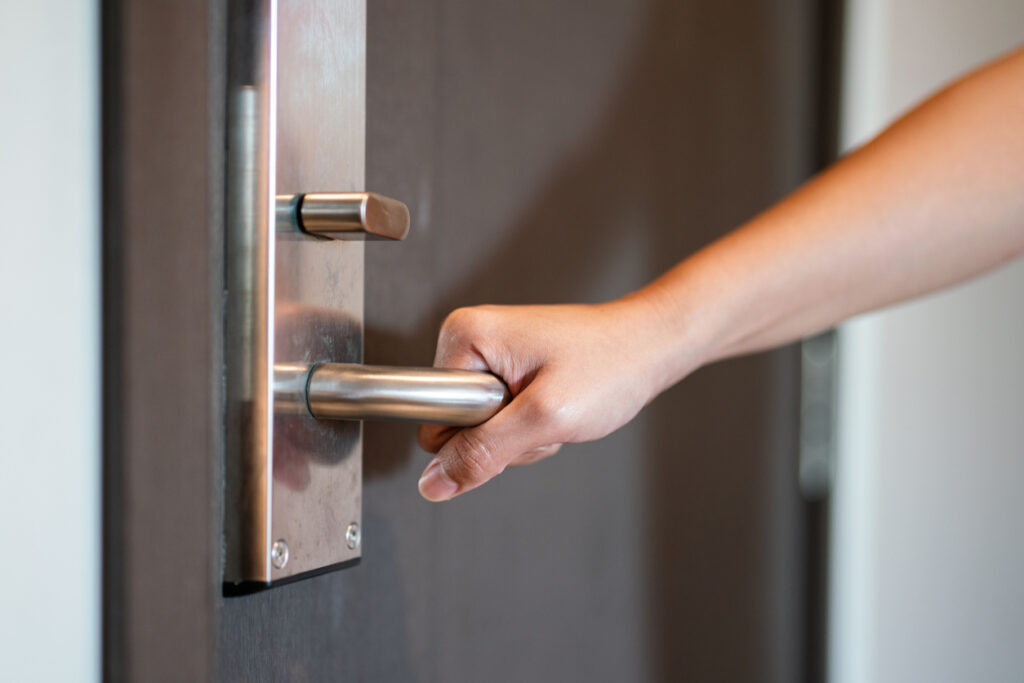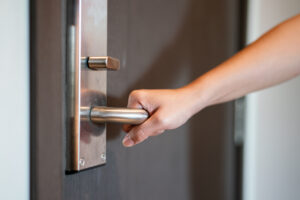When it comes to securing your property, choosing the right type of lock is crucial. Here’s an overview of common lock types:
- Deadbolts: A reliable and widely-used lock type, deadbolts come in single- and double-cylinder versions. They are often used for exterior doors and provide solid security against forced entry.
- Keyless Entry: Keyless locks allow you to enter with a code rather than a key, offering convenience and reducing the risk of lost keys. They’re popular for both residential and commercial properties.
- High-Security Locks: These locks are made from extra durable materials and are resistant to picking, bumping, and drilling, making them ideal for high-security needs.
- Smart Locks: Connected to Wi-Fi or Bluetooth, smart locks can be controlled remotely via smartphone apps. They offer added convenience and can integrate with home automation systems for advanced control.
Pros and Cons of Each Lock Type for Different Security Needs
Each lock type has unique benefits and potential drawbacks, depending on your security needs:
- Deadbolts:
- Pros: Strong, durable, cost-effective, and provides robust security.
- Cons: Requires a physical key, which can be lost or stolen.
- Keyless Entry:
- Pros: Convenient, eliminates the need for physical keys, and easy for multiple users.
- Cons: If the code is shared widely or forgotten, it can compromise security. Batteries may also need periodic replacement.
- High-Security Locks:
- Pros: Extremely resistant to picking and drilling, offering superior protection.
- Cons: Higher cost, making them less affordable for those on a budget.
- Smart Locks:
- Pros: Can be managed remotely, easily integrates with other smart home systems, and offers convenience.
- Cons: Dependent on power and internet connection; potentially vulnerable to hacking.
Tips on Choosing Locks Based on Your Home Layout and Lifestyle
Selecting the right lock depends on various factors, including your home’s layout and your daily routine:
- For Main Entrances: Deadbolts or high-security locks are ideal as they offer a strong first line of defense.
- For Multiple Household Members: Keyless entry locks or smart locks are convenient for large households, making it easy to allow access without physical keys.
- For Homes with Valuable Assets: High-security locks are recommended for areas like home offices, safes, or garages where valuables are stored.
- For Technologically-Savvy Households: Smart locks allow you to monitor who enters and exits and can be ideal for users comfortable with mobile technology.
How Regular Lock Maintenance Improves Security
Routine lock maintenance is essential for keeping your locks functioning correctly and your property secure:
- Prevents Wear and Tear: Regularly checking locks for rust, dirt, or misalignment can prevent minor issues from becoming major security risks.
- Extends Lock Lifespan: Well-maintained locks last longer, reducing the need for premature replacements.
- Improves Functionality: Lubricating locks and tightening loose screws ensures that they work smoothly, avoiding jams or malfunctions that could leave you locked out.
Importance of Using a Professional Locksmith for Installation
A professional locksmith is essential for ensuring the quality and effectiveness of your lock installation:
- Proper Installation: Trained locksmiths know the best techniques and tools to install locks securely, which reduces the risk of vulnerability.
- Compatibility Advice: Professionals can recommend the best locks for your door types and security needs, ensuring a cohesive and effective system.
- Guaranteed Quality: Many locksmiths offer warranties on their installations, providing peace of mind and added assurance.
- Enhanced Security: By using a licensed locksmith, you ensure compliance with industry standards, which helps prevent future security risks.






1 thought on “Home Security Essentials: Locks Every Homeowner Should Consider”
Alright alright alright! sumclubweb seems pretty cool. The site is clean and easy to navigate. Plus, they got a solid selection of games. I am already enjoying the game, Give sumclubweb a look see, you might find something you like!